#Screen Guild Theater
Text
Who is Brian Tyree Henry? Wiki, Career, Oscar Nomination!
#95th Academy Awards#ABC#Academy Award#actor#Angela Bassett#Atlanta#Black Panther: Wakanda Forever#Black Twitter#Breakthrough Performance#Causeway#Dolby Theater#Everything Everywhere All At Once#Jennifer Lawrence#Jimmy Kimmel#Netflix#Oscar nomination#Primetime Emmy Award#Screen Actors Guild Award#Tony Award#Variety’s Creative Impact Award
1 note
·
View note
Text

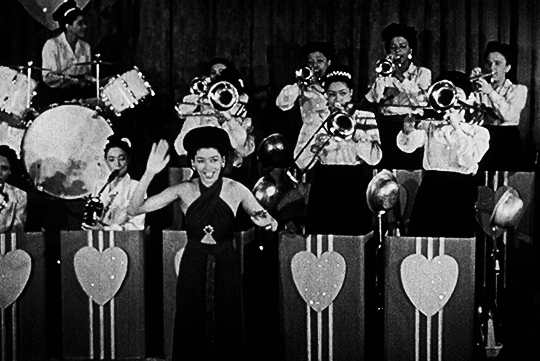
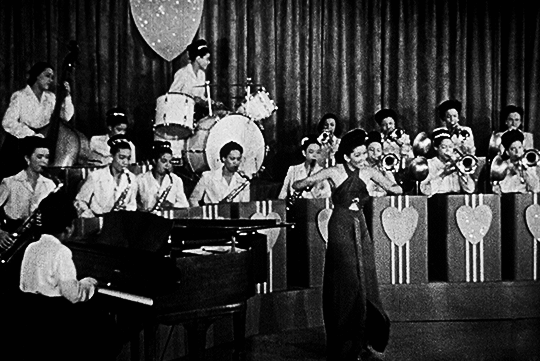
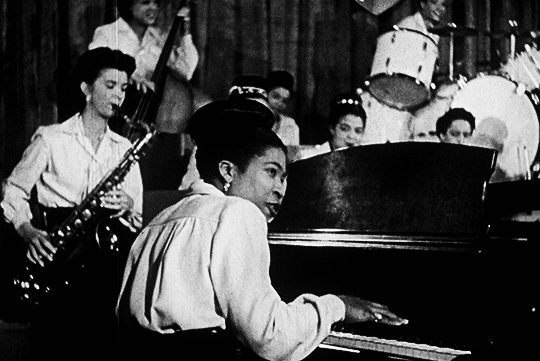
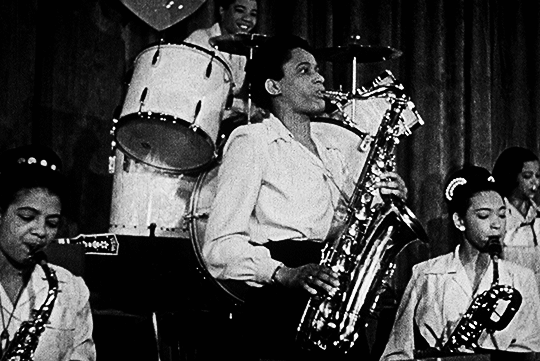

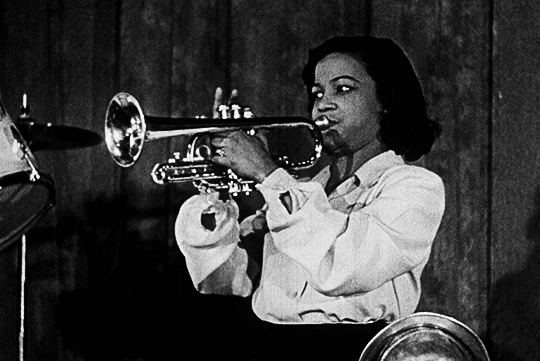
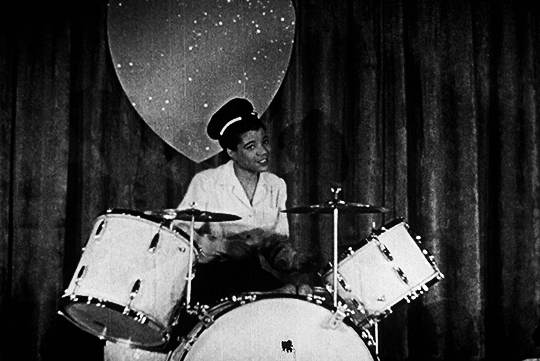
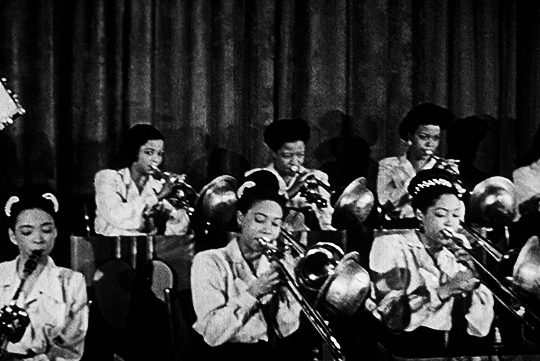
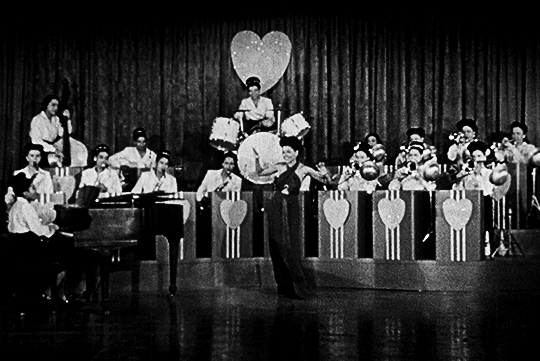
SHE'S CRAZY WITH THE HEAT — 1946
ft. The International Sweethearts of Rhythm
In 1946, William D. Alexander began the production of a series of one-reel shorts, half-hour featurettes and feature films that would serve a dual purpose. These black cast subjects would be released to theaters that welcomed African American audiences; concurrently, the music segments would be excerpted from the films and released as Soundies. Ultimately, sixteen of Alexander’s musical shorts reached the Panoram screen, spotlighting the bands of Lucky Millinder, Billy Eckstine, Henri Woode and the International Sweethearts of Rhythm. (Alexander actually produced four films with the Sweethearts, three ten-minute short subjects and one feature, although some of the performances turns up in more than one film; only three performances saw release as a Soundie.)
The International Sweethearts of Rhythm grew out of a band formed in the 1930s at the Piney Woods Country Life School, an institution – in part an orphanage – for poor African American children. A member of the music department had apparently taken note of the success of Ina Ray Hutton’s Melodears and decided that an all-woman band composed of school members might lead to something special. While they performed locally, the ISR did not begin to hit its stride until it left Piney Woods and became a professional touring outfit in 1941. The band was certainly “international” in nature, and its ranks included African American, Latina, Chinese, Indian, White and Puerto Rican musicians. In 1941, Anna Mae Winburn joined the orchestra as front woman and featured vocalist. During the war years Maurice King joined the band as both arranger and band manager.
Born Clarence King in 1911, King played reeds and later became a fine swing arranger. While here we recognize his composition and arrangement for the Sweethearts – he called this tune “She’s Crazy with the Heat ” – King is best known for his longtime association with Barry Gordy and Motown Records for which he served as director of artist development. He worked closely with vocal groups, teaching the singers how to voice and phrase together. “Maurice brought sophistication and class to Motown,” said session musician Johnny Trudell.
By 1946, the Sweethearts was recognized as one of the finest African-American bands in jazz. They recorded for Guild and RCA Records, broadcast regularly for the Armed Forces Radio Service, and toured Europe entertaining the GIs. While much of the success was due to Maurice King’s arrangements, the band’s musicians were all strong, and a special nod must go to Viola Burnside, one of the most neglected tenor soloists of the 1940s. I chatted with my friend Roz Cron, a member of the Sweetheart’s reed section, shortly before her passing.
When I thanked her for her contribution, she paused and said, “Yeah, we were one of the best, one of the very, very best.” (via Jazz on Film)
#classicfilmsource#femaledaily#filmedit#film#classicfilmedit#oldhollywoodedit#jazz#music#the international sweethearts of rhythm#she's crazy with the heat#1940s#mygifs*#soundies*
210 notes
·
View notes
Text
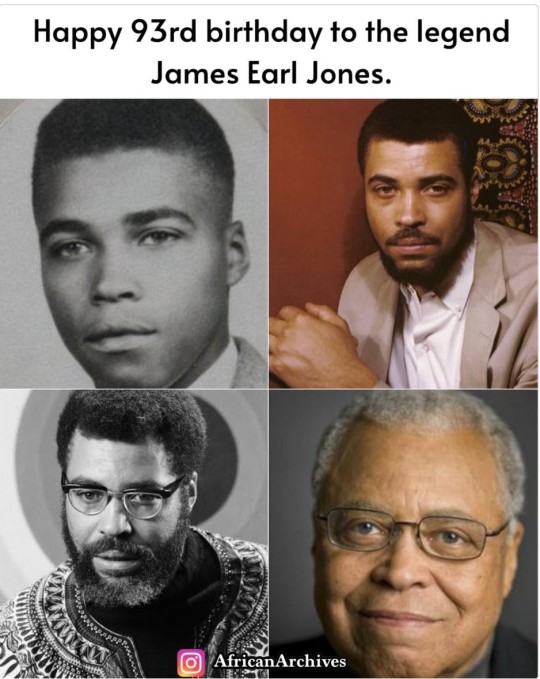
James Earl Jones (born January 17, 1931) is an American actor. Over his career, he has received three Tony Awards, two Emmy Awards, and a Grammy Award. He was inducted into the American Theater Hall of Fame in 1985. He was honored with the National Medal of Arts in 1992, the Kennedy Center Honor in 2002, the Screen Actors Guild Life Achievement Award in 2009 and the Honorary Academy Award in 2011.
Suffering from a stutter in childhood, Jones has said that poetry and acting helped him overcome the disability. A pre-med major in college, he served in the United States Army during the Korean War before pursuing a career in acting. Since his Broadway debut in 1957, he has performed in several Shakespeare plays including Othello, Hamlet, Coriolanus, and King Lear. Jones worked steadily in theater winning his first Tony Award in 1968 for his role in The Great White Hope, which he reprised in the 1970 film adaptation earning him Academy Award and Golden Globe nominations.
Jones won his second Tony Award in 1987 for his role in August Wilson's Fences. He was further Tony nominated for his roles in On Golden Pond (2005), and The Best Man (2012). Other Broadway performances include Cat on a Hot Tin Roof (2008), Driving Miss Daisy (2010–2011), You Can't Take It with You (2014), and The Gin Game (2015–2016). He received a Special Tony Award for Lifetime Achievement in 2017.
Jones made his film debut in Stanley Kubrick's Dr. Strangelove (1964). He received a Golden Globe Award nomination for Claudine (1974). Jones gained international fame for his voice role as Darth Vader in the Star Wars franchise, beginning with the original 1977 film. Jones' other notable roles include in Conan the Barbarian (1982), Matewan (1987), Coming to America (1988), Field of Dreams (1989), The Hunt for Red October (1990), The Sandlot (1993), and The Lion King (1994). Jones has reprised his roles in Star Wars media, The Lion King (2019), and Coming 2 America (2021).
Source: African Archives
175 notes
·
View notes
Text
Delayed package
Self-Aware! Fyodor Dostoevsky x GN! Reader x Self-Aware! Nikolai Gogol


Description: Right before BSD Cast got into your world, you ordered something. But, as it often happens, your package got delayed And, because of BSD Cast arrival and you moving out, you totally forgot about your package. Until one day, when it finally arrived.
Prequel to Two detectives in your bed
Warning: OOC. English is my second language.
You were mindlessly browsing the Internet. The room was dark and only light from your laptop screen illuminated the room. Thankfully, you were on vacation and have as much free time as you want. You yawn and glance in your phone screen. It was 3:00 am.
Three months before BSD Cast Arrived to this world
___________
You, probably, should go to sleep. But, you don't want to.
Many students left to visit their families. They will spend holidays with theirs relatives. Parents, siblings, cousins, grandparents and others.
You don't have a place to return to. You were talking with your relatives, yes. But, they do show you, that no one want to see you.
You were alone.
You don't have friends. Because of your insecurities, you were afraid of making friends. You were afraid of making a mistake. Of being laughed at.
But you want to have someone. You don't want to be alone anymore.
A single sob escaped your lips. Holidays were the worst. No one around. You couldn't even watch TV and cuddle with a pet, because your landlord isn't allowed pets in the apartment.
You glance at your bed. Full of pillows and few plush toys. So you can cuddle them to sleep. Pretend, that you snuggle up with someone. That you are not alone.
It was a poor substitute, but beggars can't be choosers.
You shook your head and return to the screen.
Maybe, you could watch something. Maybe, you can rewatch your favorite BSD Moments?
You nodded to yourself and start typing the link of the site, where you watch BSD. It took a few moments for it to open. And, of course, there were ads.
Premium account, new book, anime figures, dakimakuras... What?
You scroll up, looking at the small colorful ad with pictures of a few body pillows with anime characters on it. Out of curiosity, you click on the ad.
A new site was opened in a new window. It looked normal. Menu with catalog and FAQ. Search bar. Online shop cart. Contacts. Site looked good.
Just for fun, you search for BSD dakimakuras. You don't forget to choose SFW prints only.
In few moments you got your results. It wasn't much, but, all of them looked good.
You scroll down, and saw, that two dakimakuras were on sale. With Fyodor Dostoevsky and Nikolai Gogol. You click on them, taking a better look.
According to information and reviews, the pillows were big and soft, the prints were colorful. Both dakimakuras were good.
You wonder if you should buy one.
They looked good for hugging.
You cast another glance on your bed.
Body pillow would be better, that many simple pillows.
After a quick search, you discover, that site, where you saw dakimakuras, were a legit one and wasn't scamming people.
You return to the site. You... could buy both Fyodor and Gogol pillows without worrying about your finances.
But, should you?
You stare at the screen.
Your apartment was quiet. Too quiet.
You were alone.
You click on "Add to cart" option.
_______
First month... Second month... Third month...
Shop apologize for loosing package and return money. They also allow you to keep the package, if, one day, it arrived.
Then BSD cast arrived in real world...
With them came friendship.
New home. New memories.
Camping trip with ADA. Scavenger hunt with Port Mafia. Shopping trip with The Guild. Visit to museum with Rats in the house of the Dead. Laser tug with Decay of Angels. Sport competition with Hunting Dogs. Homemade theater with kids.
Walks, movie nights, game nights.
Breakfasts, lunches, dinners.
And no more loneliness.
And you completely forgot about the package.
_____
You, Elise, Mori and Karma were ready to go.
Karma and Elise need something for school, so, you all decide to go on a small shopping trip.
Right before leaving the house, you got a notification. You check it.
It was from your previous neighbors. The big package with your name on it arrived in your old apartment. And neighbors asked you to hurry up and took it from them.
You frowned. You didn't remember ordering something on your old address. Still, you didn't want to make your neighbors wait. They were good neighbors. But, you will do busy these days and your old apartment are far away.
It seems, your worried expression didn't leave unnoticed. You heard Karma's soft voice.
"[Y/N]? Is everything alright?"
You nodded mindlessly. Mostly, it was alright.
"Yes, it's just... My previous neighbors got a package with my name on it. Ask me to take it as soon as I can."
Elise tucked her hair behind the ear. She tried to give you her best puppy dog eyes.
"So, we are going without you? But, [Y/N], without you, Rintarou will be unbearable!"
Mori stands behind Elise. He also looked a tiny bit sad. Thankfully, he didn't try to make puppy dog eyes on you. You would not bear looking at Port Mafia boss, who tried to beg like this for something.
"Elise-chan, [Y/N] will decide for themselves. And here I was planning to treat you all in a restaurant."
It is a blackmail!
You huffed. But, the problem still stands. Well, time to ask someone for help. You turned around and hurry to the living room.
"Will be back in a minute!"
____
You run into Fyodor and Nikolai in the living room. Nikolai was telling a story to Fyodor, actively gesticulating. Meanwhile, Fyodor was nodding from time to time, showing, that he is listening.
Noticing you, Nikolai stopped talking and waved. His smile became even bigger.
"Birdy! Good to see you. Do you decide to stay home with us? Great! Come on, sit down, right between Fedya and I!" Kolya patted the sofa next to where he was sitting. "We will keep you warm and comfy!"
It seems, Fyodor also liked the idea of you staying home. Unfortunately, you are needed. You will be an 'anchor' for Mori. Without you, he will go overboard with shopping and at the end of the day, instead of one adult, one teen and one child, three piles of bags will return home. You shake your head.
"Sorry, but I still must go. But I need help."
You explained, in a few words, what you need.
"So, can you two, please, go to my old apartment and take the package?"
Fyodor and Nikolai looked at each other, the Fyodor nodded.
"No problems, Myshonok. Just in case, should we check, what inside the package? To make sure it isn't damaged?"
You shrugged.
"Why not? Thanks, both of you. If you need anything, just call me."
You left the living room.
And soon you, Karma, Elise and Mori left the house.
Fifteen minutes later, Fyodor and Nikolai left to your old apartment.
______
You finally were back from your shopping trip. All of you get what you need and had lunch in a small restaurant.
You were ready to go to your room, when noticed, that there was a note on your bedroom door.
"[Y/N], please, go to my room. I will give you back your package. Fyodor D. P.S.: It would be nice to spend time together. You, Kolya and I."
You smiled. It was good, that everything went well. You decide to agree to spend some time with Fyodor and Nikolai as a 'thank you' for getting the package.
You walk into your room and changed in a what you call 'shuggly clothes for Fedya and Kolya'.
You were wearing a mouse kigurumi and a scarf, that Kolya gave you.
After getting ready, you go to Fyodor's room.
______
Something feels wrong.
Fyodor was unusually quiet. He locked the door behind you. Kolya wasn't here.
And something was laying behind Fedya's bed.
Fyodor turned towards you. His expression was neutral.
"Myshonok... Your package is here."
You nervously gulped. Did someone send something bad to you?
Fyodor took a piece of paper from his desk and hold it towards you.
"It came with the package."
You read the text.
And you were mortified.
You remembered ordering two dakimakuras almost a year ago. And lost package. And the prints.
You whined and looked at Fyodor.
He was holding them in his hands.
They were soft. They were real. They were in your house, and you don't have any idea what to do with them.
Fyodor were holding two big dakimakuras.
You take a step back. Only to crash into someone else's chest. You don't need to be a genius, to realize, that you were trapped between Fyodor and Nikolai.
Fyodor nodded a little.
Suddenly, a blanket was draped over you. And Nikolai was wrapping it around you tighter and tighter.
Five minutes later, everything was over.
_____
You were laying on Fyodor's bed. You were wrapped in a blanket. Like a candy. And you were stuck between Fyodor and Nikolai.
Fyodor was laying in front of you. His hand caress your face, slowly massaging it
Nikolai was laying behind you. He was spooning you, nibbling your earlobe from time to time.
And you feel, like you were on fire. They were so close. They were so soft.
And they were teasing.
Nikolai let go of your ear and whispered right into it.
"Tell me, Birdy, will this pillow ever kiss you during cuddles?" he returned to nibbling on your ear. You whimper.
"N-no, Kolya..."
Nikolai laughed and start paying attention to the spot right behind your ears.
You felt Fyodor's warm breath on your face. You close your eyes and his fingers started massaging your eyelids.
"Myshonok, will this pillow ever give you a massage during cuddles?"
You whimper again.
"No..."
Fyodor didn't answer, but, instead, softly kissed your eyelids.
Meanwhile, Nikolai chuckled.
"So, one point to us. No points to pillows. Next round."
Position was changed.
Now you were laying face to face with Nikolai. You felt Fyodor's breath on your neck, before he starts leaving small kisses on it. Nikolai's fingers run up and down your scalp, massaging it.
And you feel even more embarrassed.
Fyodor spoke again.
"So, do you want to explain, what the deal with the pillows?"
Once again, without waiting for your answer, Fyodor continues to lightly kiss your neck.
You spoke. Your voice was trembling.
"I... I didn't know... that you were self-aware... Order them almost a year ago... Forgot about it..."
Nikolai playfully boops your nose.
"And didn't know about the bonus pillow cases."
You nod. You feel even warmer now. Fyodor and Nikolai laughed. Fyodor started nibbling on your ear.
"I am not asking about that, Myshonok."
You were pretty sure, that you became ad hot as desert sand.
"I... I was so lonely... Before you arrived. I wanted to... Pretend, that I have someone in my life."
They were quiet. Then you felt Fyodor's lips on your cheek.
"Than today we will show you, that you will never be alone again, Myshonok"
Nikolai kissed the corner of your mouth.
"Don't worry, Birdy, we will take care of you. Just enjoy the warmth. And forget about the pillows."
Nikolai's grin became sly.
"But, please, remember, did you order pillow with us with... Adult print?"
You let out a muffled scream, hiding your face in Nikolai's chest.
You had a feeling, that they will never forget about dakimakuras.
______
What came next, you can describe with only one word. Heaven. Almost.
Without teasing about prints on pillows, it would be even grater.
You were warm.
You were cuddling with Fyodor and Nikolai.
One moment you were laying on Fyodor's chest, and he was showering your forehead in kisses.
The second moment, you were pressed against Nikolai's chest and he was kissing your hands.
You were pampered. You were caressed.
You weren't alone.
You fall asleep between Fyodor and Nikolai.
Safe. Sound. Not alone.
#self-awareau#self-awarebsd#bungou stray dogs au#bsd#bungou stray dogs#bsd anime#bsd x gender neutral reader#gender neutral reader#self awarebsd#self aware Fyodor Dostoevsky#self Aware Nikolai Gogol#fyodor dostoyevsky x reader#bsd fyodor dostoevsky#bsd fyodor#fyodor dostoyevsky bsd#bungou stray dogs fyodor#fyodor x reader#dostoevsky x reader#bsd dostoevsky#nikolai gogol x reader#bsd nikolai gogol#bsd nikolai#nikolai x reader#gogol x reader#bsd gogol#bungou stray dogs gogol
261 notes
·
View notes
Text
assorted dune 2 thoughts fresh out of the theater
like the direction this version is going with chani. hell yeah let her do something! let her have friends! let her be fucking pissed!!!
hate the stilgar character assassination; i feel like it would've been natural to show his book development from skeptic/pragmatist to follower/believer in tandem with that of the other fremen. i suppose at the end of the day runtime gotta runtime but >:(
related to runtime gotta runtime: booooo show the fremen spice orgy cowards but i do absolutely respect putting off the bulk of the alia situation until the next installment
liked austin butler as feyd-rautha way more than i expected; honestly might be my favorite performance of the movie
(timmy c's is my least favorite. he's not a bad actor so much as just a deeply boring one, imho.)
LOVED florence pugh as irulan; inspired casting
the emperor's eye of sauron-ass ship sent me almost as much as casting christopher walken as shaddam iv. sure. fuck it. why not. (still devastated that josé ferrer had so little screentime in the lynch version)
WORM WORM WORM WORM
would LOVE to hear from non-book fans re: how comprehensible and watchable this was for you
the b&w sequence fucked severely
“say the word villeneuve” “h-holy w-w-ar—” “guards!”
agree with other reviewers that it was a bit odd to (under)cut the influence of the spacing guild here given that i remember them being a pretty crucial faction in dune messiah (and presumably children of dune + the other books i admittedly never got to)
overall: very prettily shot, intrigued by but not wholly displeased with the changes made, still felt kinda emotionally hollow to me but at least less so than the first movie
i think paul as a character is just damnably hard to adapt to the screen as so much of his book characterization is accomplished via internal monologue. his actions are indeed very important, the most important, but you miss out on most of his internal/existential struggle, which renders him both more unlikeable and less compelling.
more to come as i remember things probably
51 notes
·
View notes
Text
41 years ago today
Nina Hagen attends the screening of "Liquid Sky" on April 5, 1983 at the Directors Guild Theater in Hollywood, California.
Photo by Ron Galella
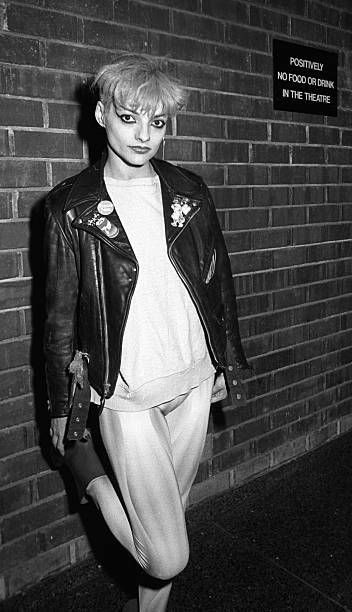
48 notes
·
View notes
Text
'Oppenheimer director Christopher Nolan told the crowd at the film’s London premiere Thursday that the cast of his film had left and are “off to write their picket signs” as SAG-AFTRA prepares to go on strike.
“I have to to acknowledge the work of our incredible cast, led by Cillian Murphy,” Nolan said from the stage. “The list is enormous — Robert Downey Jr, Matt Damon, Emily Blunt, Florence Pugh, Kenneth Branagh, Rami Malek and so many more. … You’ve seen them here earlier on the red carpet. Unfortunately, they are off to write their picket signs for what we believe to be an imminent strike by SAG, joining one of my guilds, the Writers Guild, in the struggle for fair wages for working members of their union.”...
The Oppenheimer actors came into the Odeon Luxe theater and filed into a reception. One by one they came through the lobby. Deadline saw Florence Pugh and Emily Blunt leave before Nolan came onstage. All of the cast members Deadline spoke with declared their support for the strike action.
Speaking to Deadline on the red carpet earlier, Emily Blunt said that she and the other cast members would leave the event if the guild’s leadership officially approved a walkout. “I think right now we are just sort of — I hope everyone makes a fair deal and we are here to celebrate this movie. And if they call [a strike], we’ll be leaving together as cast in unity with everyone. … We are gonna have to. We are gonna have to. We will see what happens. Right now it’s the joy to be together.”
Oppenheimer also stars Cillian Murphy as the titular Manhattan Project leader, Kenneth Branagh, Robert Downey Jr., Florence Pugh, Josh Hartnett and James D’Arcy...'
#Oppenheimer#Christopher Nolan#Cillian Murphy#Emily Blunt#Florence Pugh#Robert Downey Jr.#Josh Hartnett#James D'Arcy#Matt Damon#Rami Malek#Kenneth Branagh#SAG-AFTRA
163 notes
·
View notes
Text
95th Academy Awards: Oscars Trivia!
Another torturously long awards season is over! A24's highest-grossing film ever, Everything Everywhere All at Once, defied almost every piece of popular wisdom about the Academy Awards and easily cleared every hurdle in its path to a blowout, historic Best Picture win.
As you probably know, I'm a sucker for Oscar trivia, and this year has plenty of juicy nuggets to dig into. Let's get to it, starting with our newest Best Picture winner.
Everything Everywhere All at Once is the third film in Oscar history to win three of the four acting categories, after A Streetcar Named Desire (1951) and Network (1976). All three films won Best Actress and Best Supporting Actress. Everything Everywhere All at Once is the only film of the three that managed to win Best Picture.
Michelle Yeoh is the first Malaysian actress, first Asian actress, and second woman of color to win Best Actress. This is only the thirteenth time that Best Actress and Best Picture have overlapped in the 95-year history of the Oscars. Yeoh's nomination made her the first Asian actress nominated for the award since 1935. The only other is Merle Oberon, who hid her Asian identity in life and passed as white.
Everything Everywhere All at Once is the first science-fiction film to win Best Picture.
Everything Everywhere All at Once is the first Best Picture winner with a woman of color (Michelle Yeoh) in the lead role.
Having opened in theaters in late March 2022 (the same weekend of the 94th Academy Awards), Everything Everywhere All at Once is the Best Picture winner with the earliest calendar release since The Silence of the Lambs, which opened Valentine's Day 1991.
Everything Everywhere All at Once is the third Best Picture winner with a majority non-white cast (after 2016's Moonlight and 2019's Parasite) and the first American film with a majority Asian cast.
Daniel Kwan and Daniel Scheinert (Everything Everywhere All at Once) are the third directing team to win Best Director, joining Jerome Robbins and Robert Wise (West Side Story, 1961) and Joel Coen and Ethan Coen (No Country for Old Men, 2007). Kwan is also the fourth Asian director (and first Asian-American) to win Best Director.
Everything Everywhere All at Once is the first movie in 95 years of Oscars history to win six(!) so-called "above the line" awards -- referring to Best Picture, Director, the four acting categories, and the two writing categories.
Everything Everywhere All at Once is the first film to sweep the four primary guild awards (Producers Guild, Directors Guild, Writers Guild, and Screen Actors Guild) since Argo (2012), and only the fifth overall.
Some crazy coincidences between Michelle Yeoh and her Best Actress presenter Halle Berry: in addition to currently being the only two women of color to win Best Actress, they are also both former Bond girls (Yeoh in Tomorrow Never Dies [1997], Berry in Die Another Day [2002], both with Pierce Brosnan). Additionally, both women are former contestants of the Miss World pageant: Berry represented the United States in 1986, while Yeoh represented Malaysia in 1983. Also, in a weird case of history rhyming, both Berry and Yeoh won over a previous Oscar-winner in a film directed by Todd Field (Sissy Spacek in In the Bedroom in 2001, Cate Blanchett in TÁR in 2022).
With four wins, All Quiet on the Western Front tied with Parasite (2019), Roma (2018), Crouching Tiger, Hidden Dragon (2000), and Fanny and Alexander (1982) as the most-rewarded non-English language films in Oscars history.
This is also the second time that Cate Blanchett has won a Golden Globe, a BAFTA, and a Critics Choice Award for a performance, only to lose the Oscar to the lead of the Best Picture winner. The other time this happened was the year another comedy won seven Oscars: Shakespeare in Love. Blanchett, who was nominated for Elizabeth that year, lost to Gwyneth Paltrow.
TÁR brought Blanchett her eighth Oscar nomination, tying her as the fourth most-nominated actress in Oscar history. Only Bette Davis (10), Katharine Hepburn (12), and Meryl Streep (21) are ahead of her.
TÁR is only director Todd Field's third feature (after 2001's In the Bedroom and 2006's Little Children), but all three of his films have gotten Best Actress nominations for their leads.
Blanchett has also extended her record as the Oscar-nominated actress with the most appearances in films nominated for Best Picture. With TÁR, she has now appeared in 10 Best Picture nominees.
Tom Hanks (who turned in one of the weirdest performances ever caught on film in Elvis) also crossed the 10 Best Picture appearance threshold with this year's nominations. The only nominated actor with more Best Picture appearances is Jack Nicholson, who's been in 11.
This year's nominations saw a record-breaking number of Asian actors nominated: Yeoh in Best Actress, Ke Huy Quan (Everything Everywhere All at Once) in Best Supporting Actor, and Hong Chau (The Whale) and Stephanie Hsu (Everything Everywhere All at Once) in Best Supporting Actress. Yeoh and Quan won, marking the first time multiple Asian actors have won in a single ceremony.
Hong Chau (The Whale) is the first Oscar-nominated actor to be born in a refugee camp.
This year also saw a record number of Irish actors nominated in a single year, with five: Colin Farrell (The Banshees of Inisherin) and Paul Mescal (Aftersun) in Best Actor, Brendan Gleeson and Barry Keoghan (both from The Banshees of Inisherin) in Best Supporting Actor, and Kerry Condon (again, The Banshees of Inisherin) in Best Supporting Actress.
It was a banner year for Ireland in other categories, too, with nominations in Best Live Action Short (An Irish Goodbye, which won the award) and in Best International Feature (The Quiet Girl, the first Irish-language film ever nominated for an Oscar).
With his win in the Supporting Actor category, Quan became only the second Asian actor to win that award, joining the late Haing S. Ngor, who won for his debut performance in The Killing Fields (1984).
All five of the nominees for Best Actor -- Austin Butler (Elvis), Colin Farrell (The Banshees of Inisherin), Brendan Fraser (The Whale), Paul Mescal (Aftersun), and Bill Nighy (Living) -- were first-time nominees. This is the first time this has happened in this category since 1934(!!!).
It was a huge year for first-time nominees across all four acting categories: 16(!) of the 20 actors nominated were first-timers. This is the most ever in a single year. The only actors with previous nominations were Cate Blanchett, Angela Bassett, Judd Hirsch, and Michelle Williams.
Jamie Lee Curtis (Everything Everywhere All at Once) is the third person to be nominated for an Oscar after both of her parents were nominated as well: her father Tony Curtis was nominated for The Defiant Ones (1958), while her mother Janet Leigh was nominated for Psycho (1960). The other sets of nominated parents and children are Liza Minnelli (with parents Judy Garland and Vincente Minnelli) and Laura Dern (with parents Diane Ladd and Bruce Dern). Minnelli, Dern, and Curtis all won acting Oscars.
With his performance in The Whale, Brendan Fraser became the first person to win Best Actor for a film not nominated for Best Picture since Jeff Bridges in Crazy Heart (2009).
This is also the first time since 2005 that all four acting winners were first-time nominees. Additionally, none of the four acting winners won in their category at the BAFTAs, which has never happened before.
With his Best Supporting Actor nomination, Judd Hirsch (The Fabelmans) broke the record for the longest gap between acting nominations: he was last nominated 42 years ago for Ordinary People (1980). The record previously belonged to Henry Fonda, who had a 41-year gap between nods.
In addition to being the first actor ever nominated for a performance in a Marvel movie, Angela Bassett (Black Panther: Wakanda Forever) also became the fourth Black actress to be nominated more than once. She joined Viola Davis, Whoopi Goldberg, and Octavia Spencer.
The Fabelmans is the first movie to win the Golden Globe for Best Picture - Drama to go home emptyhanded at the Oscars since The Turning Point (1977[!]). In fact, this is the first time ever that both Golden Globe Best Picture winners (The Fabelmans in Drama, The Banshees of Inisherin in Comedy) went home with zero Oscars.
2022 had some other similarities with 1977, too: this was the first year since 1977 that two films (Everything Everywhere All at Once and The Banshees of Inisherin in 2022, Julia and The Turning Point in 1977) got four individual acting nominations. Both years saw comedies win Best Picture and Best Actress (Annie Hall in 1977), and both years had a sci-fi blockbuster nominated in Best Picture (Star Wars and Avatar: The Way of Water).
Ana de Armas (Blonde) became the second actor nominated for playing Marilyn Monroe, which is more Oscars than Monroe herself was ever nominated for. She was nominated in Best Actress alongside Michelle Williams (The Fabelmans), the other actress nominated for playing the star (in 2011's My Week with Marilyn).
De Armas also became the fifth Latina nominated for Best Actress, joining Fernanda Montenegro, Salma Hayek, Catalina Sandino Moreno, and Yalitza Aparicio. She is also the second Cuban actor ever nominated, after Andy Garcia.
With her win for Black Panther: Wakanda Forever, legendary costume designer Ruth Carter became the first Black woman to win two Oscars — ever.
Only Austin Butler and Ana de Armas were nominated for playing historical figures this year. Weirdly, both Elvis and Blonde feature actor Xavier Samuel in small roles. What does it mean?
At 34 minutes long, The Boy, the Mole, the Fox and the Horse is the longest Best Animated Short winner ever.
In addition to being the first song from an Indian film to be nominated for and win the Oscar for Best Song, "Naatu Naatu" (RRR) is the fourth non-English language winner of that award, after "Never on Sunday" (1960, originally performed in Greek), "Al otro lado del río" (2004, in Spanish), and "Jai Ho" (2008, in Hindi, Urdu, and Punjabi). "Naatu Naatu" is in Telugu.
It was the year of the sequel: between Avatar: The Way of Water and Top Gun: Maverick, this marked the first time multiple sequels were nominated in Best Picture in the same year. Black Panther: Wakanda Forever and Glass Onion: A Knives Out Mystery also received major nominations.
Avatar and Top Gun also marked the first time since 1982 that the two highest-grossing films of the year were both nominated for Best Picture.
#oscar trivia#oscars#oscars trivia#academy awards#trivia#movies#everything everywhere all at once#michelle yeoh#daniel kwan#daniel scheinert#ke huy quan#jamie lee curtis#brendan fraser#the whale#top gun: maverick#naatu naatu#rrr#the fabelmans#the banshees of inisherin#avatar: the way of water#angela bassett#cate blanchett#all quiet on the western front
374 notes
·
View notes
Text
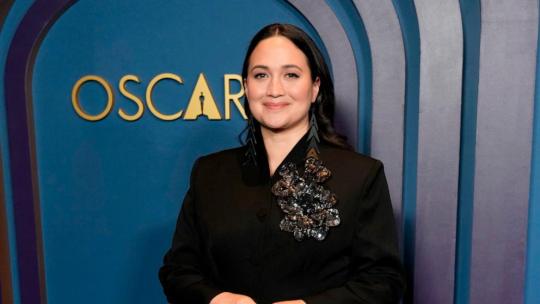
Why hoping Lily Gladstone won an Oscar does not equal valuing race over talent.
Social media is never a great place to have discussions about race and culture. The real issues at hand are way too nuanced and detailed for outrage factories like X/Twitter and Instagram to handle.
Still, I was disappointed to see so many people – perhaps willfully – missing the point online when discussion rose after the Oscars about Lily Gladstone failing to win best actress honors.
No doubt, a win for Gladstone – who would have been the first Native American woman to earn a major acting Oscar – also would have felt like a serious triumph for champions touting the power of diversity in film.
Feeling the love big time today, especially from Indian Country. Kittō”kuniikaakomimmō”po’waw - seriously, I love you all ❤️
(Better believe when I was leaving the Dolby Theater and walked passed the big Oscar statue I gave that golden booty a little Coup tap - Count: one 😉)
— Lily Gladstone (@lily_gladstone) March 12, 2024
Those of us who clock these things regularly knew that Emma Stone’s turn in Poor Things was most likely to spoil that scenario. Stone offered a showy-yet-accomplished performance as a singular character in an ambitious, creatively weird production. A much-loved past winner delivering a career-best effort, she was just the kind of nominee that Oscar loves to reward. And, as Vulture pointed out, modern Oscar voters seem to enjoy turning against expectations in big moments like this.
But when I expressed those feelings online – that Stone was marvelous and more than earned the award, but the Oscar academy really missed a chance to make history by overlooking Gladstone’s more subtle, quietly powerful turn in a better movie – the knives came out.
The gist of most negative reactions was the implication that I and others lamenting her loss were insisting that ethnicity should trump talent. As if the only or most important reason that an indigenous woman could be nominated for such a lofty award, is by people trying to bring social justice to the Oscars. (I guess Gladstone’s wins as best actress at the Golden Globes and Screen Actors Guild awards, among others, were also nods to diversity?)
As if it couldn’t be possible that perhaps -- just perhaps -- some racial cultural preferences were mixed up in Oscar voters’ attraction to the story of a beautiful, young white woman who has loads of sex while learning to define herself in a male dominated world.
What really disappointed me, however, was reading an analysis which reached all the way back to the 2017 Oscars to imply that one reason Barry Jenkins’ masterpiece Moonlight won best picture honors over La La Land was the pressure to bring social justice to the Oscars.
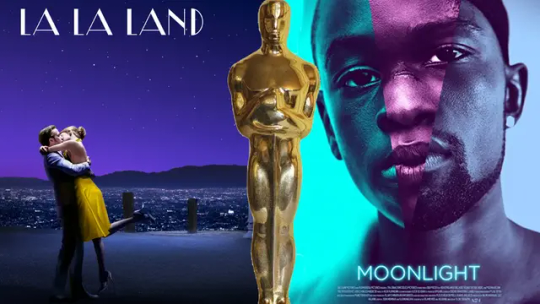
Talk about missing the point by a mile. What I’m driving at, when I advocate for contenders like Gladstone, Barry Jenkins and Jeffrey Wright, isn’t a finger on the scale to make up for past exclusion.
It’s a plea for Oscar voters to see these performances the way I and so many other people actually see them.
I still remember watching last year’s version of The Color Purple in a screening alongside lots of folks from Black fraternity and sorority organizations. And when the moment arrived where Danielle Brooks’ character intoned about her husband, “I loves Harpo — God knows I do — but I’ll kill him dead before I let him or anybody beat me,” it felt like the whole theater said those words with her. That’s how iconic those lines -- first spoken on film by Oprah Winfrey in the 1985 production – have become for Black America.
youtube
That same feeling came after I first saw Cord Jefferson’s brilliant American Fiction, centered on a frustrated, floundering Black writer who creates a stereotypical parody of a Black novel as a dark joke, only to see it become a best seller. I felt as if Jefferson had pulled the same bait-and-switch with his movie that his lead character managed onscreen – using the outrageous premise to draw us all into a more subtle and deliberately powerful story of a Black man struggling to connect with his family after huge losses.
I needed three attempts to get through watching all of Gladstone’s work in Killers of the Flower Moon. Not because the movie was so long I had to “get my mail forwarded to the theater,” like Oscars host Jimmy Kimmel joked. But because it was so hard for me to watch a film centered on the historic exploitation and murder of Native American people by white men.
It sounds like a simple idea, but it’s worth repeating: evocative moments in films will speak differently to different people.
Sometimes, when I’m pushing for a win in an awards category, or championing a particular project, it’s not because I’m putting a finger on the scale for the sake of equality. It’s because I’m more invested in that story than some others because of who I am. And I’m challenging some people, who might not see their cultural preferences as preferences, to consider exactly why they love one thing over another.
In many ways, it is sad to see great artists pitted against each other in these contests. Comparing the delightful, dangerous absurdity of Poor Things to the gritty, punishing tone in Killers of the Flower Moon feels like a fool’s errand, anyway.
But with so much that comes from an Oscar win – including proof that inclusion brings success, accolades and a great argument for more equity – it is important to understand why some people value some performances.
And part of living in a diverse society means valuing the wide range of opinions and reactions, not shrugging off those that don’t fit your worldview.
29 notes
·
View notes
Text
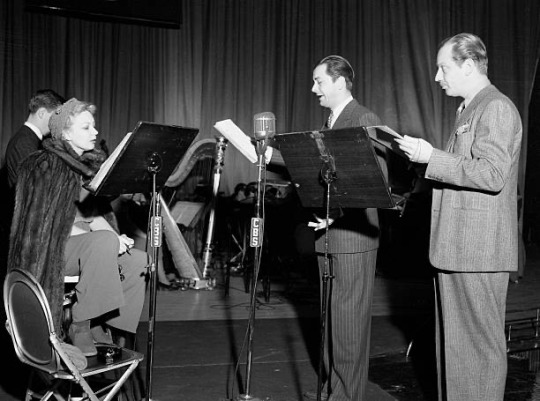
Ann Sothern, Robert Young, and Melvyn Douglas performing "I Met Him In Paris" for “The Gulf Screen Guild Theater” in 1940.
25 notes
·
View notes
Text
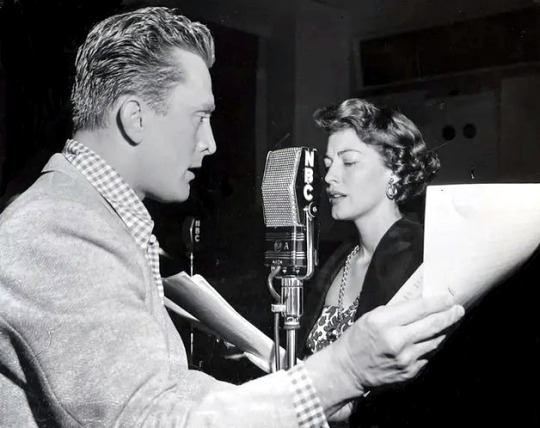
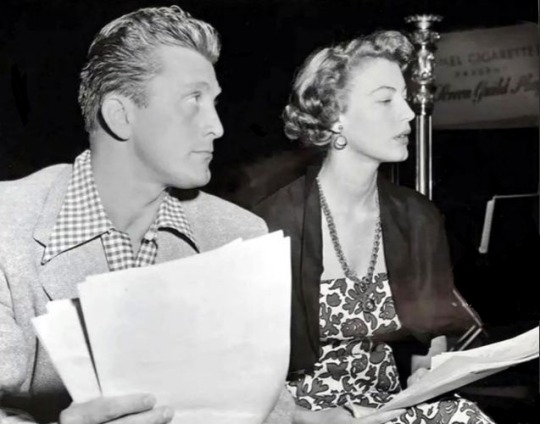

Ava Gardner with Kirk Douglas from the 1949 Camel Screen Guild Theater performance of Flesh and Fantasy
69 notes
·
View notes
Text
Fredi Washington
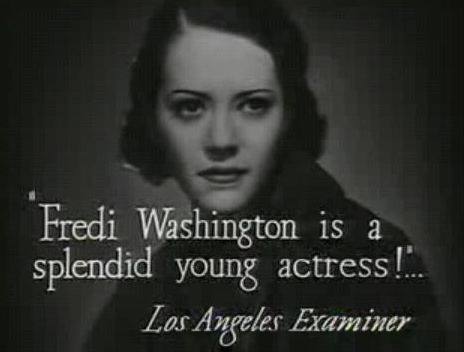
Fredericka Carolyn "Fredi" Washington (December 23, 1903 – June 28, 1994) was an American stage and film actress, civil rights activist, performer, and writer. Washington was of African American descent. She was one of the first Black Americans to gain recognition for film and stage work in the 1920s and 1930s. Washington was active in the Harlem Renaissance, her best known role being Peola in the 1934 film version of Imitation of Life, where she plays a young light-skinned Black woman who decides to pass as white. Her last film role was in One Mile from Heaven (1937), after which she left Hollywood and returned to New York to work in theatre and civil rights activism.
Fredi Washington was born in 1903 in Savannah, Georgia, to Robert T. Washington, a postal worker, and Harriet "Hattie" Walker Ward, a dancer. Both were of African American and European ancestry. Washington was the second of their five children. Her mother died when Fredi was 11 years old. As the oldest girl in her family, she helped raise her younger siblings, Isabel, Rosebud, and Robert, with the help of their grandmother. After their mother's death, Fredi and her sister Isabel were sent to the St. Elizabeth's Convent School for Colored Girls in Cornwells Heights, near Philadelphia, Pennsylvania.
While still in school in Philadelphia, Washington's family moved north to Harlem, New York. Washington graduated from Julia Richman High School in New York City.
Washington's entertainment career began in 1921 as a chorus girl in the Broadway musical Shuffle Along. She was hired by dancer Josephine Baker as a member of the "Happy Honeysuckles," a cabaret group. Baker became a friend and mentor to her. Washington's collaboration with Baker led to her being discovered by producer Lee Shubert. In 1926, she was recommended for a co-starring role on the Broadway stage with Paul Robeson in the play Black Boy. She quickly became a popular, featured dancer, and toured internationally with her dancing partner, Al Moiret.
Washington turned to acting in the late 1920s. Her first movie role was in Black and Tan (1929), in which she played a Cotton Club dancer who was dying. She acted in a small role in The Emperor Jones (1933) starring Robeson. In 1933, Washington married Lawrence Brown, the trombonist in Duke Ellington's jazz orchestra. That marriage ended in divorce. Washington also played Cab Calloway's love interest in the musical short Cab Calloway's Hi-De-Ho (1934).
Her best-known role was in the 1934 movie Imitation of Life. Washington played a young light-skinned Black woman who chose to pass as white to seek more opportunities in a society restricted by legal and social racial segregation. As Washington had visible European ancestry, the role was considered perfect for her, but it led to her being typecast by filmmakers. Moviegoers sometimes assumed from Washington's appearance—her blue-gray eyes, pale complexion, and light brown hair—that she might have passed in real life. In 1934, she said the role did not reflect her off-screen life, but "If I made Peola seem real enough to merit such statements, I consider such statements compliments and makes me feel I've done my job fairly well." She told reporters in 1949 that she identified as Black "...because I'm honest, firstly, and secondly, you don't have to be white to be good. I've spent most of my life trying to prove to those who think otherwise ... I am a Negro and I am proud of it."[7] Imitation of Life was nominated for an Academy Award for Best Picture, but it did not win. Years later, in 2007, Time magazine ranked it as among "The 25 Most Important Films on Race."
Washington's experiences in the film industry and theater led her to become a civil rights activist. In an effort to help other Black actors and actresses find more opportunities, in 1937 Washington co-founded the Negro Actors Guild of America, with Noble Sissle, W. C. Handy, Paul Robeson, and Ethel Waters. The organization's mission included speaking out against stereotyping and advocating for a wider range of roles. Washington served as the organization's first executive secretary. She was also heavily involved with the National Association for the Advancement of Colored People, widely known as the NAACP. While working with the NAACP, Fredi fought for more representation and better treatment of Black actors in Hollywood because she was one of the few Black actors in Hollywood who had some influence with white studio executives. Aside from working with those organizations to fight for the rights of Black actors, Washington also advocated for the federal protection of Black Americans and was a lobbyist for the Dyer Anti-Lynching Bill, which the NAACP supported.
Despite receiving critical acclaim, she was unable to find much work in the Hollywood of the 1930s and 1940s; Black actresses were expected to have dark skin, and were usually typecast as maids. Directors were concerned about casting a light-skinned Black actress in a romantic role with a white leading man; the film production code prohibited suggestions of miscegenation. Hollywood directors did not offer her any romantic roles. As one modern critic explained, Fredi Washington was "...too beautiful and not dark enough to play maids, but rather too light to act in all-Black movies..."
Washington was a theater writer, and the entertainment editor for The People's Voice (1942–1948), a newspaper for African Americans founded by Adam Clayton Powell Jr., a Baptist minister and politician in New York City who was married to her sister Isabel Washington Powell. She was outspoken about racism faced by African Americans and worked closely with Walter White, then president of the NAACP, to address pressing issues facing Black people in America.
In 1952, Washington married a Stamford dentist, Hugh Anthony Bell, and moved to Greenwich, Connecticut.
Fredi Washington Bell died, aged 90, on June 28, 1994. She died from pneumonia following a series of strokes at St. Joseph Medical Center in Stamford, Connecticut.
23 notes
·
View notes
Text
Hey! Everyone should support the writers strike! It’s incredibly important! If you love theatre as well as television, I would like to draw your attention to another group of writers in this country (the USA, unfortunately) that desperately need help.
Playwrights only make on average ten-thousand dollars for each show they produce. This is accounting for royalties, although with incredible luck or a really nice commission those can bring it up to around twenty-thousand. To make matters worse, the average playwright can only produce one show per year. To put that into perspective, in order to make the average American yearly wage of thirty-thousand dollars, a playwright would need to write and produce two to four plays every year in high-end regional theatres. That’s a feature-length original play every three to six months. Most plays take over a year to fully develop.
On top of that, unlike screenwriters who are often employees of a company, playwrights are considered to be owners of capital, as we own the exclusive rights to produce their show. Because of that, we are not allowed to unionize. This means that our only form of protection, the Playwrights Guild of America, can’t do much other than help playwrights avoid bad contracts. This is an extremely valuable service to be sure, but it can’t solve the problem that only the luckiest playwrights in the country can make a living on this art form.
There are a lot of other issues that compound this problem. Most plays only ever receive one run, which means that playwrights don’t usually earn residuals. Many theaters will contract staged readings of a play for which they do not pay the author. While theaters expect playwrights to be present during the development of a new play, they won’t pay them for their time during early production meetings, auditions, or rehearsals. It all combines to make kind of a perfect storm.
If you like live theatre, this should concern you! If you feel like modern theatre is stale and repetitive, it’s because people who are truly passionate about play writing are forced to split their time between multiple forms. Without enough dedicated theatre writers, we lose access to the originality and novelty that set the stage apart from the screen. Don’t get me wrong, there are some extremely talented and devoted playwrights out there who are able to make things work. But how can people expect great work from us when we can’t even do this work full-time?
So what can you do to help? The first thing you can do is SUPPORT THE WRITER’S STRIKE. Because most playwrights can’t make a living writing plays, they often supplement work in the theatre with work on TV or in other spaces. Helping out Hollywood writers will help put a lot of playwrights in better positions.
You can also support theaters like Playwrights Horizons in Washington DC who provide playwrights with full fellowships in exchange for their plays. These are valuable as they allow a playwright to spend all of their time on their chosen medium rather than needing to juggle multiple jobs to make ends meet.
Other than this, it’s hard to say what normal people can actually do here. It would be nice if there could be a union for playwrights like there is for actors, but as long as playwrights own the means of production this would probably only shift the problem from our backs onto the backs of actors, directors, and designers. And budgets for new shows are already tight enough as things stand, it seems like a lot to ask to carve more of that money out for writers when things are already difficult.
Here’s an excellent article about the situation from American Theatre that goes over a lot of the information I did here in more detail (without the pro-union editorialization.) https://www.americantheatre.org/2014/12/10/paying-playwrights-more-than-play-money/
TLDR; Helping screenwriters helps playwrights too, but a lot more needs to be done before we’re out of the woods. The average playwright can’t make a living play writing, and the only writers in the industry who can are extremely lucky. Trying to solve this problem is critical for the future of theatre.
86 notes
·
View notes
Text

About a thousand protesters converged on Hollywood on Sunday ahead of the Academy Awards ceremony to call for an immediate cease-fire in the Israel-Hamas war.
Their presence frustrated Oscars organizers and traffic control. Shortly before the ceremony was set to begin at 4 p.m., dozens of black vans carrying attendees stood at a standstill on Highland Avenue.
“Go, go, go!” one organizer yelled as he frantically waved at cars to move through the intersection at Sunset Boulevard and Highland near the Dolby Theatre, where the ceremony was set to start. Some Oscar-goers ditched their cars and walked toward the venue. By the time the ceremony began, police had cleared access routes.
Three hours earlier, demonstrators began gathering by the hundreds at the intersection of Sunset Boulevard and Ivar Avenue, about a mile east of the theater on Hollywood Boulevard.
The demonstrators then spilled out to Sunset Boulevard, waving Palestinian flags and occupying the eastbound side of the street.
“Let’s shut it down!” protesters chanted as they swarmed Sunset.
The crowd began moving westward on the boulevard, led by a white van with half a dozen people on top chanting into a microphone and megaphone.
About 40 police officers in riot gear stood vigilant at the intersection of Sunset Boulevard and Las Palmas Avenue, one block west of the approaching crowd.
“Free free Palestine!” the crowd chanted to a drumbeat — waving posters showing a movie slate painted in black, white, green and red, the colors of the Palestinian flag — with a message addressed to the Oscar audience: “While you’re watching, bombs are dropping.”
Demonstrators also gathered earlier around the Hollywood Boulevard exit off the 101 Freeway and at the intersection of Sunset and Vine. Still others rallied on La Brea and Franklin avenues, near the Dolby Theatre, waving signs saying “Cease-fire now.”
[...]
Miguel Camnitzer, a member of Jewish Voice for Peace of Los Angeles, said he recently joined the pro-Palestinian cause. The grandson of Jews who fled Germany during the Holocaust, the 44-year-old said he could not stand by while Palestinians are killed.
“I just can’t sit home today watching an awards show when a genocide is going on in the name of my people and with a previous genocide having happened to my people,” he said. “I was raised believing it’s a collective responsibility from preventing that from anyone else.”
For Sarah Jacobus, a mentor for young writers, protesting the Israel-Hamas war is more about getting food, water and other necessities to her mentees, some of whom are in Rafah in southern Gaza.
“They’re hanging on for dear life,” Jacobus, 72, said. “Two are in Rafah, one in a tent with his family and another in a room with about 50 people.” She said one of her mentees needs diapers for his 2-month-old, but “what they need more than anything is freedom.”
Joining the demonstration on Sunset, several members of the Screen Actors Guild and the American Federation of Television Radio Artists showed their support for Palestinians and a cease-fire, holding a large SAG-AFTRA poster at the front of the crowd.
One of the protesters was a 35-year-old actress whose aunt and uncle are sheltering in a church in Gaza, she said. She requested anonymity for fear of retaliation against her family in Gaza and herself in the entertainment industry.
“Hollywood is complicit,” she said, as she marched west toward the Dolby Theatre with the crowd. “There is this racist ideology running rampant inside [SAG], and there is no punishment for it.”
-- From "1,000 Gaza protesters rally in Hollywood ahead of Oscars, blocking traffic" by Ashley Ahn for Los Angeles Times, 10 Mar 2024
18 notes
·
View notes
Text
While there wasn’t anything at the 2023 Game Awards about Dragon Age: Dreadwolf, there was a small protest group outside the building that was about unionizing in game development and the large amount of layoffs this year in the industry. BioWare isn’t mentioned by name but Keyword Studio’s union is mentioned ! Here’s my scans of their brochure they were handing out if anyone is interested!
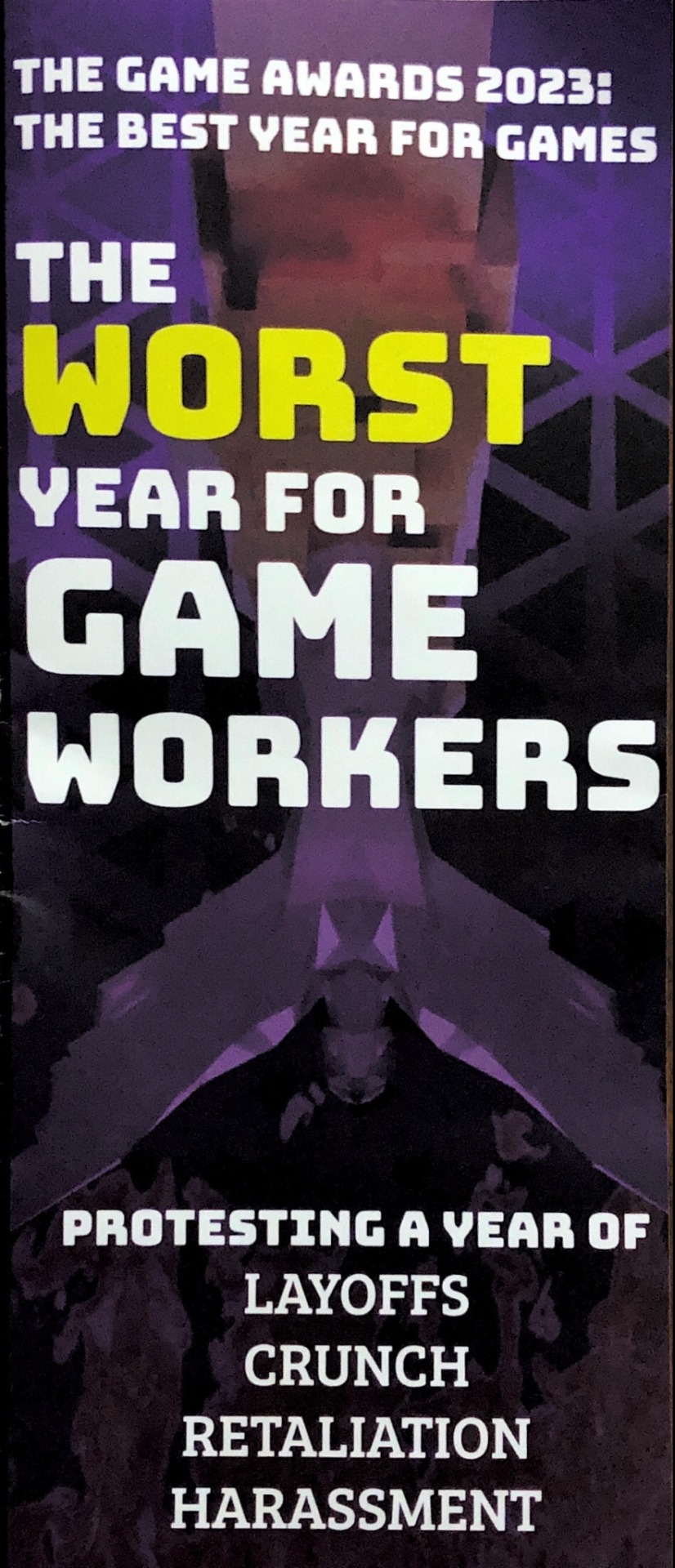


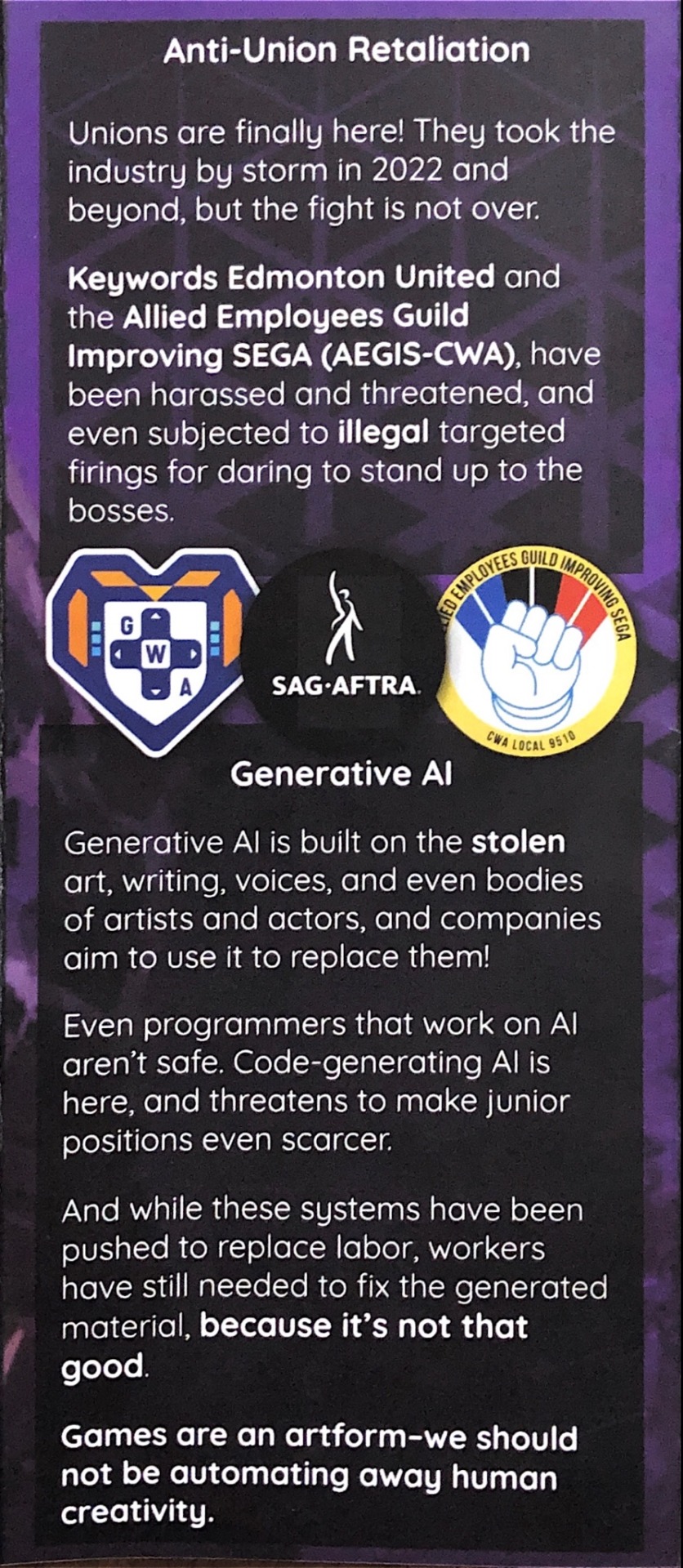
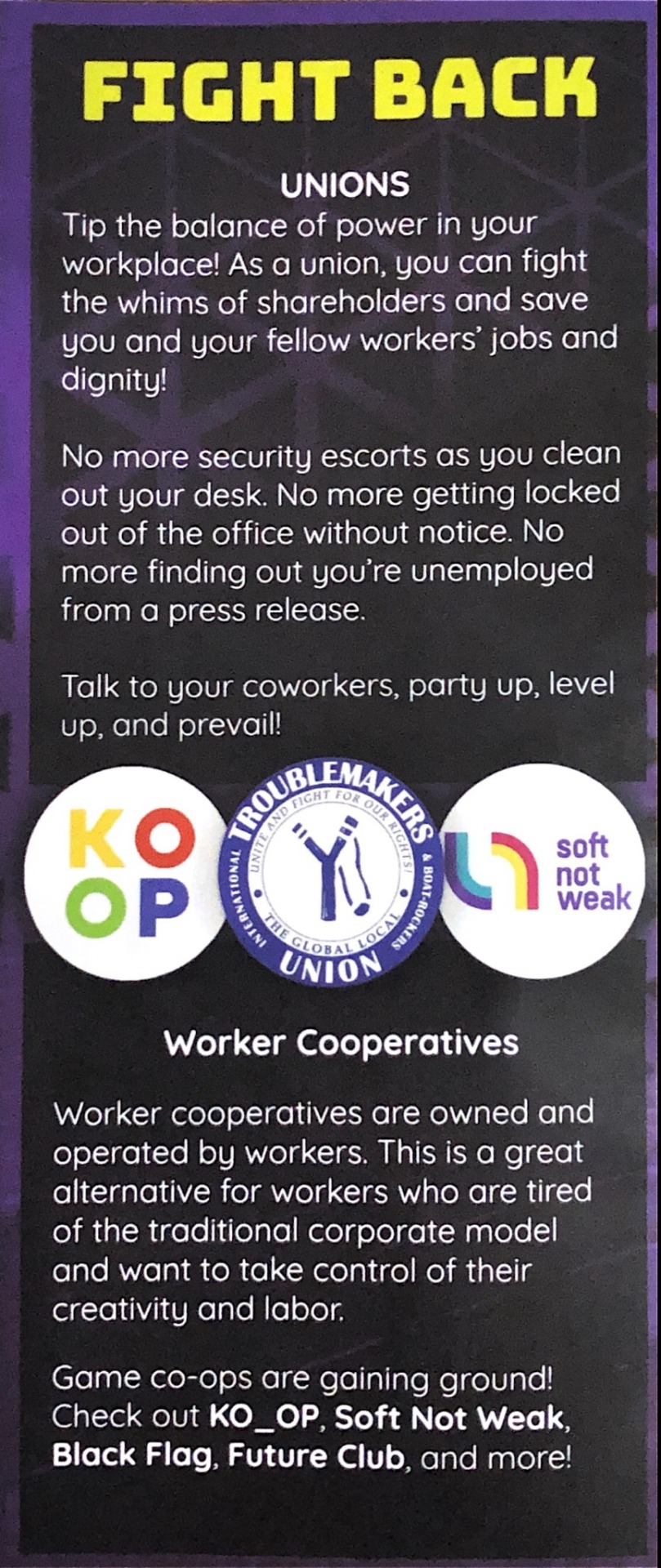
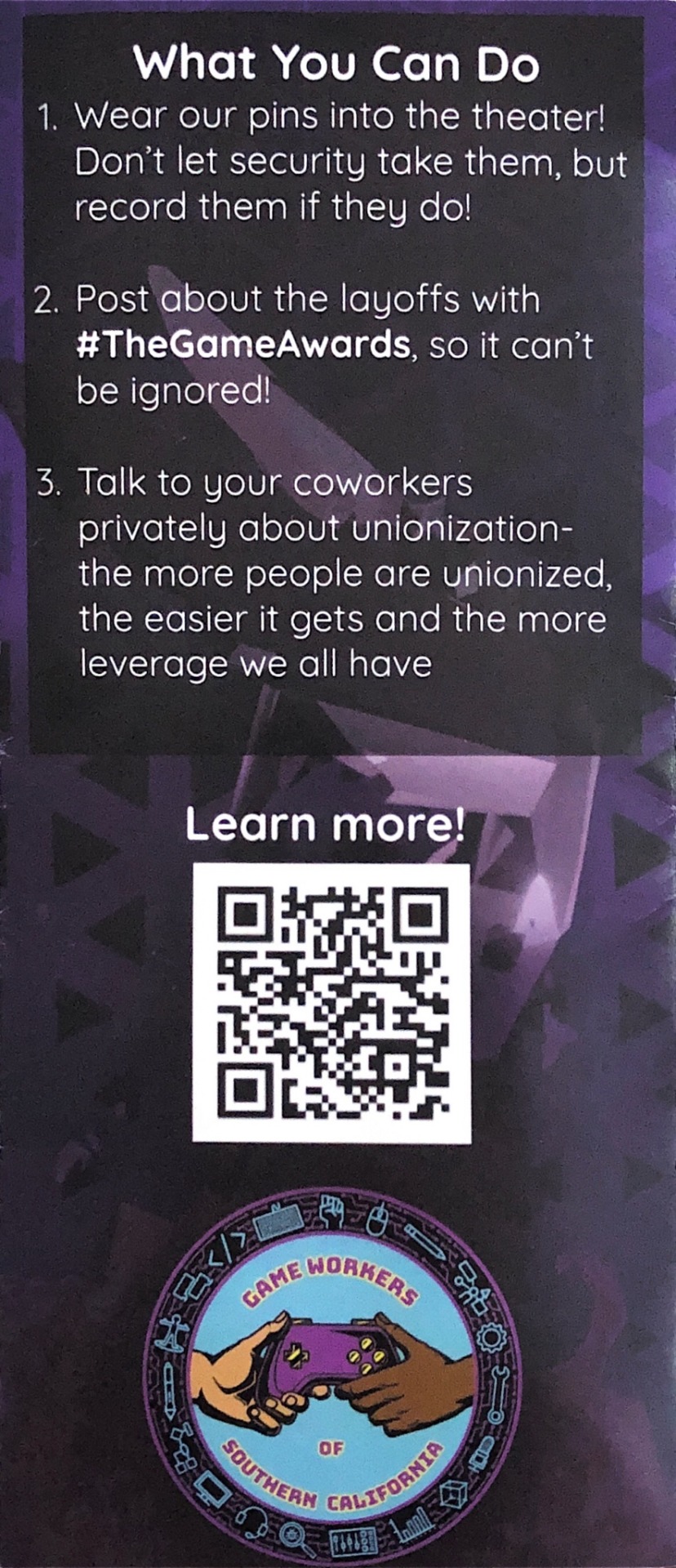
Updated to add alt text for those with screen readers
[begin alt text]
The Game Awards 2023: The Best Year for Games
The Worst Year for Game Workers
Protesting a year of layoffs
[next page]
The 2023 game industry: $188 billion in revenue
9000+ Layoffs (source: LA Times, videogamelayoffs.com)
…and that’s surely an undercount. It’s hard to overstate just how disastrous this has been for the workers who actually make games and for the health of the industry as a whole.
More layoffs means more competition for fewer open positions. More competition means lower wages and burnout. Burnout and lack of positions force workers out of the industry.
All that talent, gone. And those that remain still suffer! The work piles up in fewer desks, you don’t know if your next. These are poor conditions for working, let alone for the creativity and care needed to create games.
[next page]
Welcome to The Game Awards 2023: She’ll of an Industry Edition
This year has been full of amazing games from Hi-Fi Rush to Armored Core VI.
Unfortunately, the workers creating these games have seen the worst layoffs in decades.
We’ve lost our livelihoods, our colleagues, and our passion. We’re forced to accept lower pay or leave the industry, joining an exodus of talent that grows by the day.
This year has been nothing less than a crisis for the industry.
But we can fight this. Over the last two years, workers have been organizing into unions to defend themselves, and building worker cooperatives to create the spaces we deserve.
We need to keep up the pressure to prevent the collapse of the real industry: the workers that make it.
[next page]
Anti-Union Retaliation
Unions are finally here! They took the industry by storm in 2022 and beyond, but the fight is not over.
Keywords Edmonton United and the Allied Employees Guild Improving Sega (AEGIS-CWA) have been harassed and threatened, and even subjected to illegal targeted firings for daring to stand up to the bosses.
Generative AI
Generative AI is built on the stolen art, writing, voices, and even bodies of artists and actors, and companies aim to use it to replace them.
Even programmers that work on AI aren’t safe. Code-generating AI is here, and threatens to make junior positions even scarcer.
And while these systems have been pushed to replace labor, workers have still needed to fix the generated material, because it’s not that good.
Games are an artform— we should not be automating away human creativity
[next page]
Fight Back
Unions
Tip the balance of power in your workplace! As a union, you can fight the whims of shareholders and save you and your fellow workers’ jobs and dignity!
No more security escorts as you clean out your desk. No more getting locked out of the office without notice. No more finding out you’re unemployed from a press release.
Talk yo your coworkers, party up, level up, and prevail!
Worker Cooperatives
Worker cooperatives are owned and operated by workers. This is a great alternative for workers who are tired of the traditional corporate model and want to take control of their creativity and labor.
Game co-ops are gaining around! Check out KO_OP, Soft Not Weak, Black Flag, Future Club, and more!
[next page]
What You Can Do
1. Wear our pins into the theater! Don’t let security take them, but record them if they do!
2. Post about the layoffs with #TheGameAwards, so it can’t be ignored!
3. Talk to your coworkers privately about unionization- the more people are unionized, the easier it gets and the lore leverage we have.
Learn more at cohost.org/gwsc
[end alt text]
19 notes
·
View notes
Text
“Barbenheimer”—the collective celebration around the release of the Barbie and Oppenheimer movies—has collided with the wedding industrial complex. That’s not a joke. According to a Variety story this week, people are planning on taking their friends and family, prenuptials, to see the two films as a double feature. People who aren’t getting married are planning similar movie-watching marathons. It’s the kind of viral cultural moment marketing teams dream of. It also feels like a sign of the end times.
This sense of dread doesn’t stem from the public’s collective yearning to absorb stories about a Mattel doll and the development of atomic weapons at the same time. It’s because this weekend promises the kind of “let’s all go to the movies!” hype (and box office haul) that cinemas haven’t seen since before the Covid-19 pandemic shut theaters down—and it’s happening as Hollywood is going on strike.
This week, WIRED rolled out a series of stories detailing what we believe the future of entertainment might entail. The purpose was to look at how all aspects of culture, from books to video games to YouTube, could be impacted by advancements in technology. As we worked on it, though, something happened: Contract talks between Hollywood studios and the writers and actors unions began to break down. One of the major sticking points in those negotiations was the use of artificial intelligence in movie- and TV-making. Suddenly, as Madeline Ashby wrote in her essay this week, the world was in the midst of Hot Strike Summer.
Then, Hot Strike Summer slammed into the Barbenheimer moment. Once the Screen Actors Guild—American Federation of Television and Radio Artists, or SAG-AFTRA, called for a walkout, stars could no longer smile on red carpets without looking like scabs. The stars of Oppenheimer walked out of the film’s London premiere when the strike began. The cast and filmmakers behind Barbie, which premiered before SAG called for a strike, voiced their support. Soon, “This Barbie Is Now on Strike” became the headline, transforming one of the world’s most well-known figurines into Norma Rae. The marquee at my local theater in Brooklyn listed both movies alongside the phrase “Atomic Kenergy,” while The New York Times asked, “Can I Watch ‘Barbenheimer’ Despite the Hollywood Strikes?” (Short answer: Yes.)
To that end, the strikes will not affect Oppenheimer or Barbie’s opening weekend box office numbers. Earlier this week, AMC Entertainment reported that some 40,000 people had bought tickets for both films, and together they’re estimated to make around $150-200 million domestically, with Greta Gerwig’s send-up of the Mattel doll bringing in a bigger chunk than Christopher Nolan’s historical drama about the man behind the atomic bomb.
But what matters is what happens after this weekend. By all accounts, Hot Strike Summer seems poised to last beyond one season. Even before SAG went on strike, studio sources were telling reporters that the plan was to let the strike “drag on until union members start losing their apartments and losing their houses.” In response to that, actor Ron Perlman took to social media to say “listen to me, motherfucker—there’s a lot of ways to lose your house.” He later walked that back, but when Hellboy enters the chat, you know it’s not going to end gently.
The longer writers and actors are on strike, the bigger the hole next summer or the summer after that, when the movies that would be filming right now aren’t ready. (Deadpool 3 and the sequel to Mission: Impossible—Dead Reckoning Part One, for example, are both currently on hold.) Cinemas have been bouncing back in the years since Covid restrictions were lifted and people began feeling comfortable in movie houses again. A lackluster year brought on by a dearth of films could prove detrimental.
Yesterday, Comic-Con International began in San Diego. Typically, or at least before the pandemic, the event has been full of panels with flashy stars promoting their next big movie or TV series. As long as SAG is on strike, those celebs won’t show. Some attendees will likely welcome the event’s return to its comics roots, rather than the Hollywood hype-fest it has become. But no matter what happens, it will be unlike any Comic-Con in recent memory. Maybe a little less plastic, but not fantastic.
37 notes
·
View notes